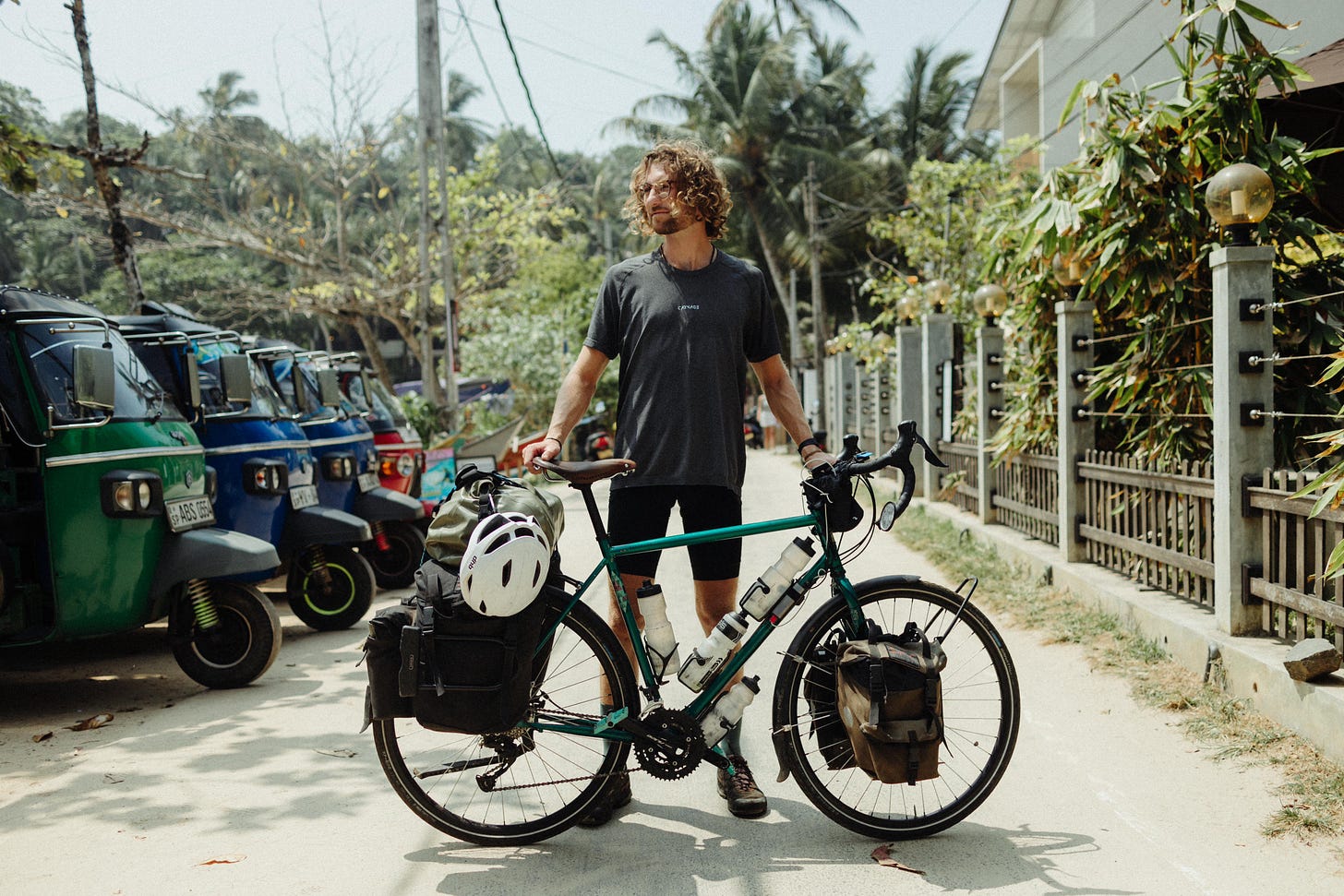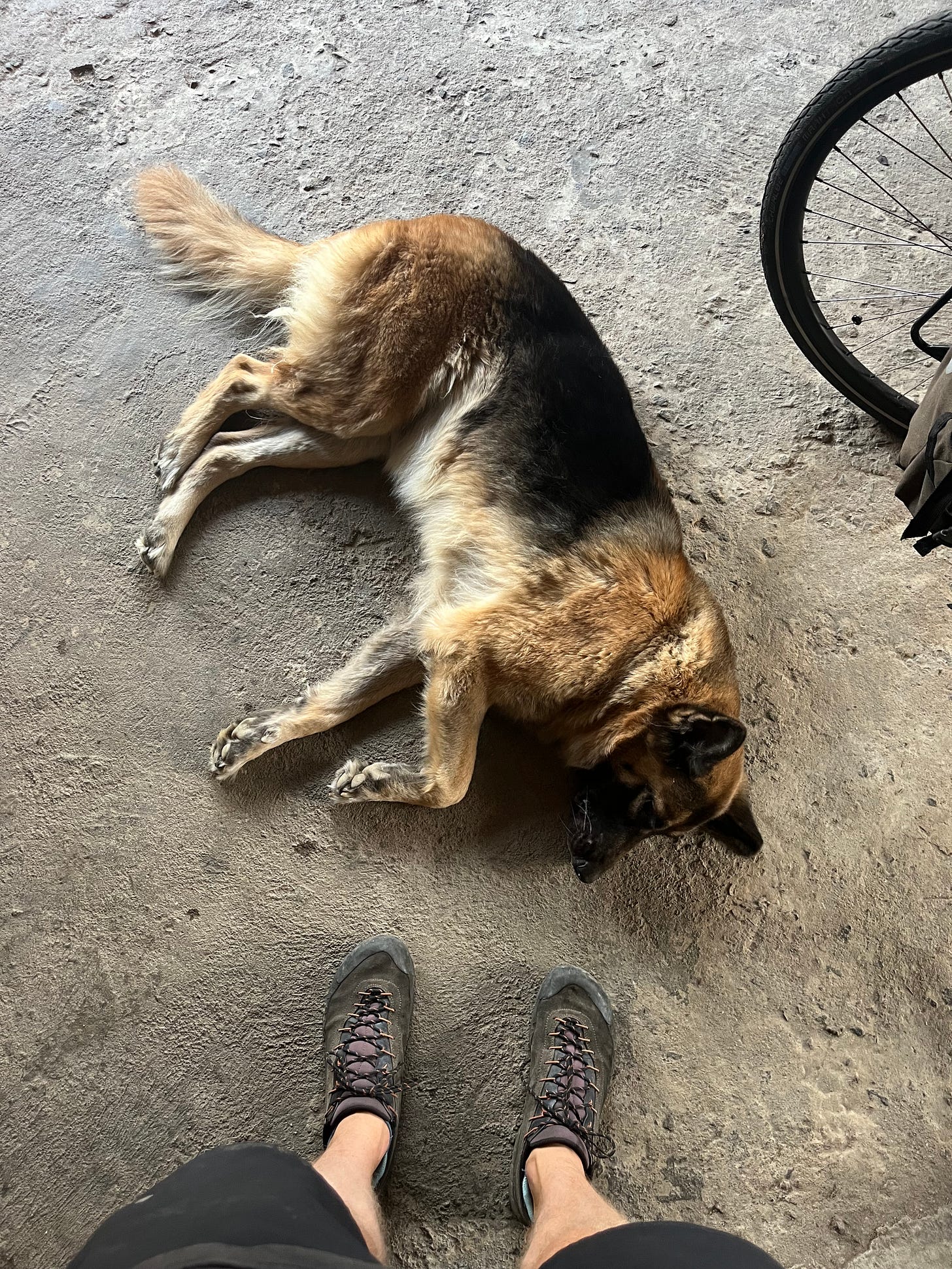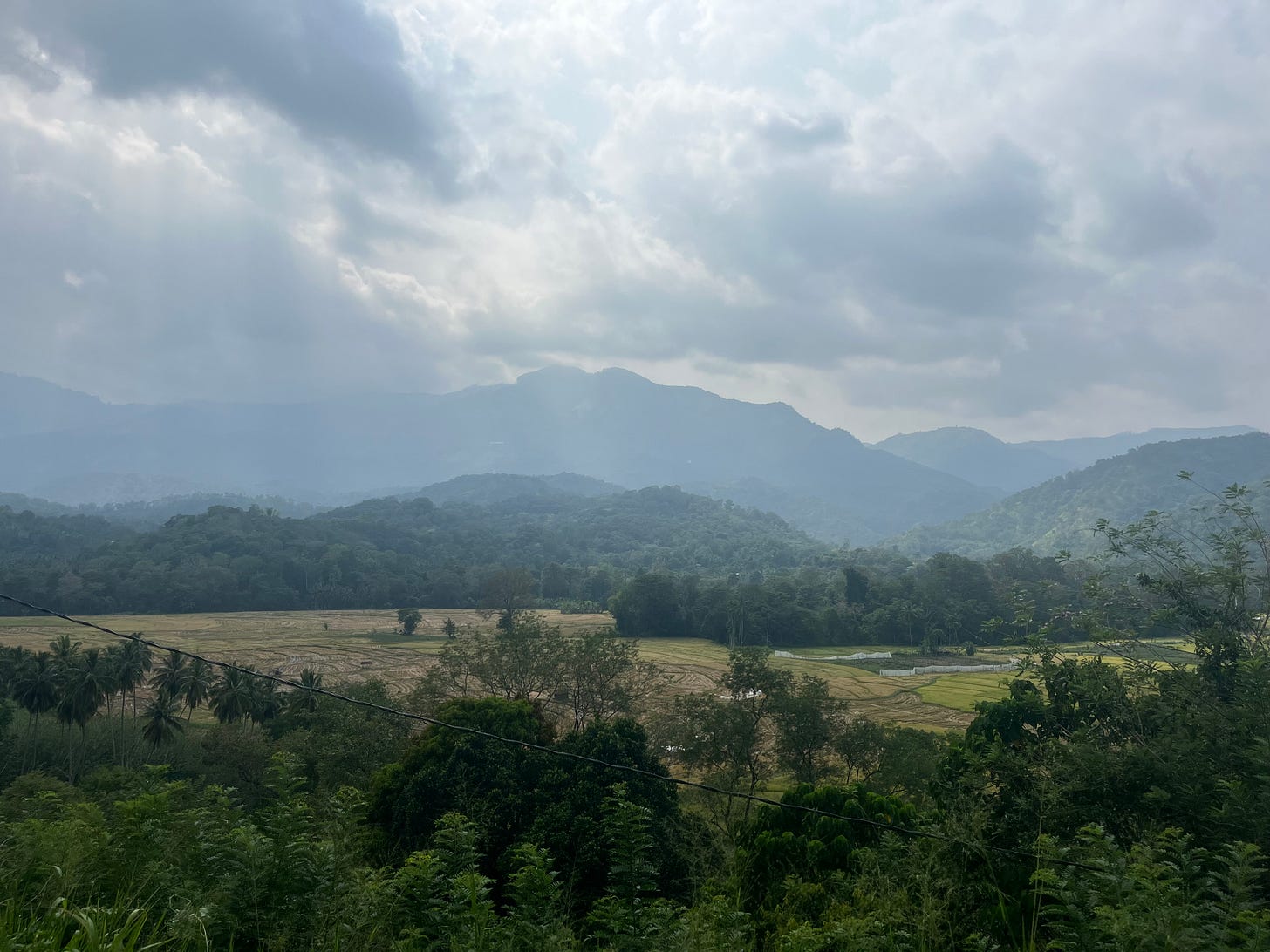175 | Books, travel and horizons
Ella, Sri Lanka
When I stopped drinking I tried quitting for a year yet still found myself drunk every Thursday night. "What the heck," I would think, "can I not make it a full week?". Each week, I'd set the same intentions, but — as if cursed — I'd wake up with a hangover on Friday. Classic.
We get stuck in loops. When we do, we think doing the same thing leads to different outcomes. The following amnesia story reminded me why we get trapped.
*
A woman fell over and hit her head and suffered partial amnesia. She forgot what had happened the previous week, and her immediate memory lasted just one minute. In her hospital bed, the woman repeatedly asked: "What's going on? Where am I?"
This was worrying and exhausting for her daughter, who took responsibility to explain, "You've had a fall … you're in hospital … you're safe …"
The daughter, tired of answering, wrote a synopsis for her mother to read. She placed the note on the bed.
Every minute, her mother would pick up the note and read it aloud. Then she'd return the note on her lap, look up bewildered and ask, "Is this the first time I'm reading this?" — at that point, her memory would reset, and she'd begin again.
Each time the amnesiac read the note, she'd talk with the same intonation, identical emphasis and pauses; she'd stop in the same places and look up. She'd ask the same question, and then — snap — her memory would reset.
Scary. (She recovered, so don't worry[1])
Aside from being a terrifying reminder of the fragility of our minds, this story taught me that if we consume the same inputs (the cold white hospital walls, the pale blue linen and the handwritten note), we get identical outcomes. We need a new setting, inputs, and ideas to do life differently. By repeating teen behaviours, we never grow up; by not pivoting our business, we're trapped in the wrong founding ideas; when dating for two months and then leaving, we only date for two months—and then leave. In short, repeating begets identical results. It's a truism, but we can act once we realise it.
*
New experiences and ideas get us out of the loop. We have new experiences when travelling and reading, so I think they are essential. Books and travel flood us with new information, allowing the leaping from ruts.
And analogy is sci-fi.
Whatever our species achieves (e.g. landing on the moon) begins as a thought. It spooks me to consider that someone once had the first thought of an aeroplane, a smartphone, or a computer. In most cases (especially recently), the thinker was a sci-fi author because a science fiction novel describes a future. The sci-fi writers are the true innovators. Downstream from the sci-fi writers are the entrepreneurs inspired by their books; they build at the frontier. Beyond the entrepreneurs are early adopters who step into the space shuttle or buy the Apple Vision Pro at first release.
We don't have new ideas if we don't invent science fiction. It's like damning the source of a river of innovation. And just like the woman with amnesia, we'll sink into a samsara of stagnated outcomes.
When we read sci-fi, we glimpse potential futures. While most of the futures won't be invented because they are unpleasant or crazy or impractical, some might exist (even if they are unpleasant and crazy). We are now, for example, unboxing the tepidly anticipated 'Metaverse', coined in the novel Snow Crash by Neil Stephenson (from Wikipedia):
The term metaverse originated in the 1992 science fiction novel Snow Crash as a portmanteau of "meta" and "universe". In Snow Crash, the metaverse is envisioned as a hypothetical iteration of the Internet as a single, universal, and immersive virtual world that is facilitated by the use of virtual reality (VR) and augmented reality (AR) headsets
Thirty-two years later, Stephenson's Metaverse is nearly here, delivered via the Quest and the Vision Pro, demonstrating the power of ideas. Without ideas at the foundation of inventions, would they be built? They could not even be considered. Like a society with amnesia, we'd get stuck in a loop of non-creation and not evolve.
As individuals and a society, we are constrained by what we believe is possible. Sci-fi fills this gap for society. Unthinkable futures (both good and bad) become 'potential' futures because of their fictional invention. They don't exist and live unconceived and unmapped like dark matter. Then, like a firework exploding at night, they are conceptually invented and exist. (Even if deemed impossible, they are more possible given that we imagined them).
*
Travelling and reading broaden our horizons of what is possible in our lives. It's exposure therapy to other people's stories, which do the equivalent job as sci-fi only for individuals. Without such exposure, we get stuck, like the woman with amnesia.
The people we meet tell us of alternative realities (as sci-fi might). "They have done it, so why can't we?"
For instance, I had never considered building a house out of clay in Portugal. I didn't know it was possible. Then I met somebody building with clay, and it's now a potential future. A friend is learning to paraglide professionally—this was never on my radar. Likewise, with books, I never considered giving up my material possessions and living as a poor dishwasher in Paris. Then I read Orwell's Down and Out in Paris and London, and it's considered though unappealing. Biographies tell of the capacity of one brief human life; self-help books tell how to actualise ourselves; Bell Hooks explains that having healthy personal relationships is plausible.
So whenever we feel stuck, we can look at our inputs and reason that their consistency makes our life consistently frustrating. So buy those train tickets [2], talk to your weirdest friend about her hobbies, flick through Tesson's book about living in a cabin for six months, and read anything about the dire lives of published authors. Books and travel allow us to peer over the edge of whatever we suspect is impossible and recognise we can walk that way, too.
[1] The daughter's close friend said, "Your mum's amnesia sounds like me when I'm on ket. I think she'll be fine." The mother was—she recovered a few weeks later.
[2] I began cycling with some ideas upside-down in my mind. I suspected the pretty scenery would impact me in the long run. And those adorable monkeys. I assumed that tasting different cuisines would shift my perspective: Would the vast borderless cultures awaken something adventurous inside me? Might the dilapidated domes of the Hagia Sophia emphasise that religions are delicate and temporary? Might Egypt's east desert explain how I’m cosmically insignificant? —surely a billion stars painted a metre above my tent, just out of reach and so bright I could read would tell me of something. Instead, it's the people, not the guidebooks, who continually open my eyes and heart. Some humans I met are fulfilled living in a commune in Ibiza—perhaps I would be too; they cycle Oman with their three kids (age 5, 8 and 10), or survive as migrating volleyball coaches—could I do both? Strangers meet their partner in middle age when hiking the Camino—so will I have to wait? One worked six am ‘till ten pm serving beer in a Dolomite hut to experience those clear mountainous sunrises. Now I'd like to see those sunrises, too.
My week cycling east…
It was hard to say goodbye to Hiriketiya’s paradise. If I had stayed another week, I would have stayed a decade. It is fantastic: an immaculate bay, alive community, surf, cool king coconuts, and a guesthouse that felt like home. But now I’m rolling, and that sense of infinite adventure has returned. India’s vast hot sub-continent doesn’t seem far away.
Today I’m writing from Ella, up in the mountainous interior of Sri Lanka. This week, I followed the coast road east to where it abruptly ends on the edge of Yala National Park. I then cycled north through the undulating park. I had called the park rangers to ask whether I could cycle the road. “But too much elephants,” they told me. “I know, but is it legal to cycle?” I asked. “It’s legal, but we can’t recommend it. Too much elephant.” Anyway, I only met one! The elephant watched my pedals turning with astonishment; ‘what is this slow mechanical creature?’ He seemed to say.
Ella is a zoo of tourists—like a cheap Austrian ski resort, high up and cool in the evening. It’s bisected by a busy road which roars as buses and Tuks struggle on the incline; 90% of the people here are Western tourists, very often Russian. The hills around us are immaculate tea plantations filled with middle-aged women picking leaves and dropping them into white plastic sacks. Yesterday, I hiked a segment of the Pekoe Trail, a 300 km trail network through the Central Highlands (recommended). Tomorrow, I’ll continue north towards the Knuckles Mountain Range and spend a couple of days on those empty peaks.
My week in books…
Reading: Snow Crash by Neil Stephenson. Stalin: Paradoxes of Power by Stephen Kotkin. A Distant Mirror by Barbara Tuchman.
Live well,
Hector
PS. Constructive criticism is beneficial to both giver and recipient, but the fact that people often can't deliver negative feedback without social risk discourages the behavior. I’d love your feedback, especially while I’ll be writing more and experimenting with said writing; please reply to this email or share your anonymous feedback here: https://www.admonymous.co/hector <3





